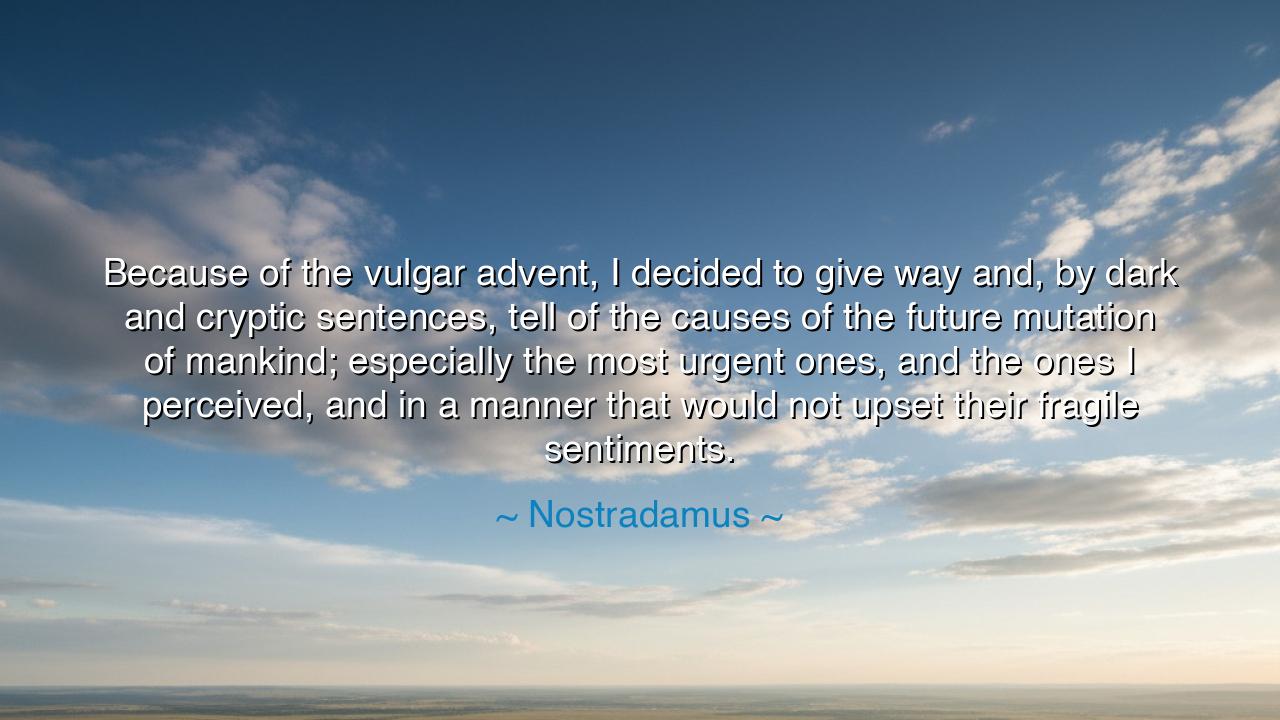
Because of the vulgar advent, I decided to give way and, by dark
Because of the vulgar advent, I decided to give way and, by dark and cryptic sentences, tell of the causes of the future mutation of mankind; especially the most urgent ones, and the ones I perceived, and in a manner that would not upset their fragile sentiments.






"Because of the vulgar advent, I decided to give way and, by dark and cryptic sentences, tell of the causes of the future mutation of mankind; especially the most urgent ones, and the ones I perceived, and in a manner that would not upset their fragile sentiments." These words, spoken by the great Nostradamus, offer a glimpse into the mind of a man who saw the turbulence and unrest of his time, and sought to forewarn the world of the changes to come. In his cryptic manner, he veiled the truth in metaphor and mystery, understanding that the truths of the future were often too unsettling to be fully understood by the minds of his contemporaries. He acknowledged the fragility of human sentiment, and so he chose a path of obscurity, veiling his warnings in riddles to avoid stirring panic or despair.
In ancient times, there were many prophets and seers who, like Nostradamus, looked into the future and tried to understand the great shifts that would shape the course of history. The Oracle of Delphi was one such figure, whose words were often shrouded in riddles, for the future was seen as a realm of profound mystery, and too direct an understanding of it could break the spirit of those who heard it. Heraclitus, the philosopher, spoke of change as the very essence of existence—"You cannot step into the same river twice." Yet even he understood that change was a double-edged sword: it could bring both growth and destruction, and the future, for all its possibilities, was something that required wisdom to navigate.
Nostradamus, too, seemed to recognize the duality of the future. In his time, the world was teetering on the brink of disaster: plagues, wars, and political turmoil marked the age. He was acutely aware that to speak too plainly of these future mutations of mankind—to reveal the truth too clearly—would likely cause fear and confusion. The human soul, fragile in its hope and imagination, was not prepared to face the stark reality of a world in transformation. And so, Nostradamus chose the method of obscurity, using cryptic sentences that would allow his warnings to be preserved, but without causing the immediate shock that would overwhelm the people of his time.
This practice of veiling prophecy in mystery and symbolism was not unique to Nostradamus but has been a common thread in the history of prophetic figures. Consider the story of Joseph, the Hebrew prophet who interpreted Pharaoh’s dream of seven years of plenty followed by seven years of famine. Joseph did not simply present the future as a straightforward prediction. He used the symbolism of the dream—seven lean cows and seven fat cows—to convey a message that required interpretation. The future, it seems, is too complex and vast to be understood in simple terms; it demands metaphor, riddles, and layers of meaning that allow it to be grasped slowly, in ways that do not shatter the psyche.
The great mutation of mankind, as Nostradamus foresaw, was a transformation that would touch every aspect of human existence: our social structures, our values, and our understanding of the world. Yet this change was not to be feared but understood as part of the cycle of life. Every civilization has its rise and fall, its moments of decay and rebirth. Just as the ancient Romans were swept away by the tides of time, giving way to the medieval world, so too would humanity face its own set of challenges. But these challenges, though daunting, could lead to greater wisdom and growth if approached with courage and preparedness.
The lesson to be drawn from Nostradamus' words is this: change is inevitable, and while the future remains shrouded in mystery, it is our responsibility to face it with both foresight and humility. Like the ancient seers, we must learn to see the future not as something to be feared but as something that can be shaped by our actions in the present. We must not become consumed by fear or anxiety about what is to come, but instead act with wisdom in the present moment, understanding that every action we take shapes the world we will inherit. Nostradamus, through his cryptic messages, urges us to recognize the fragility of our human condition and to act with the knowledge that the future, though uncertain, is something we can influence through our choices.
In our own lives, let us not shy away from the challenges of the future. Let us not be paralyzed by the uncertainties that lie ahead, but instead, let us prepare ourselves for the transformations to come. Like the prophets of old, we must be ready to embrace change, to face it with courage and insight, and to shape it in ways that will allow us to rise, like the phoenix, from the ashes of the old. The future is not a distant threat but a canvas waiting to be painted with the actions of the present. Let us live with that knowledge, and in doing so, ensure that we leave behind a legacy worthy of the great mutations that are yet to come.






AAdministratorAdministrator
Welcome, honored guests. Please leave a comment, we will respond soon